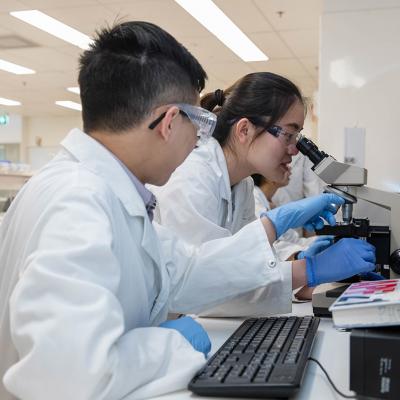Curious about what you can do with a pharmacy degree? Look no further.
Here we'll explore the diverse career paths and study options available for future pharmacists. Whether you're a recent high school graduate or considering a career change, let's discover where a pharmacy degree can take you.
Is pharmacy a good career in Australia?
Pharmacists are integral to healthcare and are highly trusted professionals in Australia.
As health care evolves, the demand for skilled pharmacists is on the rise. With advancements in medical research and technology driving innovation in pharmaceuticals and patient care, the opportunities for pharmacists to make a meaningful impact on population health have never been greater.
Australia's investment in healthcare infrastructure and workforce development further highlights the promising outlook for pharmacy professionals. As an industry, pharmacies are also predicted to grow by another 4.62% between 2024 and 2029. There are approximately 38,800 pharmacists employed in the country, and this number is projected to increase by 1,600 each year.
So, whether your interests lie in patient care, research, or community health initiatives, a career in pharmacy provides a range of fulfilling pathways to pursue.
What is the role of a pharmacist?
At their core, pharmacists are responsible for administering prescription or over-the-counter medicine to patients to enable them to manage acute or chronic conditions.
As a registered pharmacist, you may:
- support patients directly in community pharmacy, preparing or supervising the dispensing of medicines, ointments, tablets and other products
- work with patients and other medical professionals in hospitals
- aid pharmaceutical companies or research institutions in developing the next life-saving medicines
- work for or with the government, providing policy advice around medicines to keep populations healthy and safe.
The specific job description of a pharmacist depends on the type of pharmacist you want to be and the setting in which you want to work.
There are many different types of pharmacists, including:
Community pharmacist

Community pharmacists work in the typical pharmacies we see in our local communities, and they are often the first point of contact for healthcare needs.
These pharmacists strive to improve the wellbeing of diverse community members, including the elderly, children, young families, and those with chronic or complex medical conditions.
While they are medicines experts like all pharmacists, their main role is assessing patients' conditions to determine if they can offer over-the-counter treatments or if a visit to a general practitioner for prescribed medication is needed. They can also perform other tasks including administering vaccinations and, in some pharmacies, compounding medicines.
Compounding pharmacies are regular community pharmacies where the pharmacists can make, or compound, their own generic versions of name-brand medicines in house. These medicines are customised to meet the specific needs of individual patients and are not commercially available, and they therefore are often not listed on the Pharmaceutical Benefits Scheme (PBS), making them one of a kind.
Hospital pharmacist

Hospital pharmacists work in (you guessed it!) hospitals. They are part of a wider healthcare team including other medical professionals, store personnel and administration staff. They oversee the medication needs of patients undergoing treatment, monitoring their health and adjusting prescriptions as necessary.
Collaborating closely with nurses and doctors, hospital pharmacists ensure seamless communication with the dispensary for accurate medication distribution, contributing to effective patient care plans.
Hospital pharmacists are involved in every aspect of patient care, from medication reviews in pre-admission clinics to post-discharge care. They actively participate in ward rounds as part of a multidisciplinary team, contributing significantly to patient wellbeing.
The role of a hospital pharmacist is incredibly diverse, with responsibilities varying based on patient needs. From surgical procedures and infectious diseases to cancer treatment and mental health concerns, hospital pharmacists are dedicated to aiding patients on their path to recovery.
Consultant pharmacist
Consultant pharmacists are engaged by community pharmacies or hospitals on a freelance or contractual basis. Their responsibilities may include conducting medication reviews for residential care patients and outpatients. Additionally, they share best practices and expertise with communities to disseminate effective treatments and therapies as required.
Industry pharmacist

Industrial pharmacists conduct research, testing and analysis in various aspects of drug development, production, storage, quality control and distribution. They operate across multiple sectors, including:
- manufacturing
- professional services
- education
- wholesale trade.
Research pharmacist

Eager to be at the forefront of medicinal breakthroughs? Pharmaceutical researchers are constantly using the latest technology to determine the effects of medicines, come up with new ways of producing medicine, and develop new drugs entirely.
An example of the innovative research pharmacists can be part of is the 3D printing of medication, where a specific amount of medication can be added to one tablet, based on the person who will be taking it, to create a personalised dose.
Rural and remote pharmacist
Pharmacists don’t just have to work where most of the population is, either. They can immerse themselves in an entirely different experience to the typical urban community and hospital pharmacy roles by working in rural and remote communities.
Rural pharmacists often undertake different tasks to city pharmacists based on the different environment, playing a monumental role in promoting and improving healthcare for the people who call these places home.
Learn more about rural pharmacy from two students who did their placement in these locations:
Pharmacy careers outside the box
Pharmacists also share their passion for medicine in a range of other settings, treating populations of varying levels of need and specialty. These include but aren’t limited to:
- Aged care – working within a specialised aged care team to support older clientele who have specific care requirements
- Pharmaceutical policy – working with governments to develop policy around medicines to ensure populations stay safe and healthy and receive the medicines they need to manage and prevent certain conditions
- Defence – working as a pharmacist in an army health unit
- Patent law – understanding what makes specific drugs different from others, and protecting the intellectual property of manufacturers
- Pharmaceutical sales and marketing – working with pharmaceutical companies to promote the latest drug developments to those who can prescribe and administer them.
Ready to be at the forefront of the pharmacy profession? Explore what it’s like to study pharmacy at UQ and meet UQ’s Associate Professor shaping the pharmacy space.





